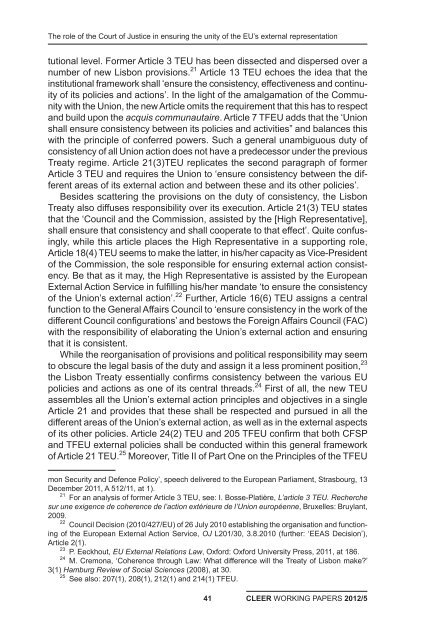Principles and practices of EU external representation - TMC Asser ...
Principles and practices of EU external representation - TMC Asser ...
Principles and practices of EU external representation - TMC Asser ...
You also want an ePaper? Increase the reach of your titles
YUMPU automatically turns print PDFs into web optimized ePapers that Google loves.
The role <strong>of</strong> the Court <strong>of</strong> Justice in ensuring the unity <strong>of</strong> the <strong>EU</strong>’s <strong>external</strong> <strong>representation</strong><br />
tutional level. Former Article 3 T<strong>EU</strong> has been dissected <strong>and</strong> dispersed over a<br />
number <strong>of</strong> new Lisbon provisions. 21 Article 13 T<strong>EU</strong> echoes the idea that the<br />
institutional framework shall ‘ensure the consistency, effectiveness <strong>and</strong> continuity<br />
<strong>of</strong> its policies <strong>and</strong> actions’. In the light <strong>of</strong> the amalgamation <strong>of</strong> the Community<br />
with the Union, the new Article omits the requirement that this has to respect<br />
<strong>and</strong> build upon the acquis communautaire. Article 7 TF<strong>EU</strong> adds that the ‘Union<br />
shall ensure consistency between its policies <strong>and</strong> activities” <strong>and</strong> balances this<br />
with the principle <strong>of</strong> conferred powers. Such a general unambiguous duty <strong>of</strong><br />
consistency <strong>of</strong> all Union action does not have a predecessor under the previous<br />
Treaty regime. Article 21(3)T<strong>EU</strong> replicates the second paragraph <strong>of</strong> former<br />
Article 3 T<strong>EU</strong> <strong>and</strong> requires the Union to ‘ensure consistency between the different<br />
areas <strong>of</strong> its <strong>external</strong> action <strong>and</strong> between these <strong>and</strong> its other policies’.<br />
Besides scattering the provisions on the duty <strong>of</strong> consistency, the Lisbon<br />
Treaty also diffuses responsibility over its execution. Article 21(3) T<strong>EU</strong> states<br />
that the ‘Council <strong>and</strong> the Commission, assisted by the [High Representative],<br />
shall ensure that consistency <strong>and</strong> shall cooperate to that effect’. Quite confusingly,<br />
while this article places the High Representative in a supporting role,<br />
Article 18(4) T<strong>EU</strong> seems to make the latter, in his/her capacity as Vice-President<br />
<strong>of</strong> the Commission, the sole responsible for ensuring <strong>external</strong> action consistency.<br />
Be that as it may, the High Representative is assisted by the European<br />
External Action Service in fulfilling his/her m<strong>and</strong>ate ‘to ensure the consistency<br />
<strong>of</strong> the Union’s <strong>external</strong> action’. 22 Further, Article 16(6) T<strong>EU</strong> assigns a central<br />
function to the General Affairs Council to ‘ensure consistency in the work <strong>of</strong> the<br />
different Council configurations’ <strong>and</strong> bestows the Foreign Affairs Council (FAC)<br />
with the responsibility <strong>of</strong> elaborating the Union’s <strong>external</strong> action <strong>and</strong> ensuring<br />
that it is consistent.<br />
While the reorganisation <strong>of</strong> provisions <strong>and</strong> political responsibility may seem<br />
to obscure the legal basis <strong>of</strong> the duty <strong>and</strong> assign it a less prominent position, 23<br />
the Lisbon Treaty essentially confirms consistency between the various <strong>EU</strong><br />
policies <strong>and</strong> actions as one <strong>of</strong> its central threads. 24 First <strong>of</strong> all, the new T<strong>EU</strong><br />
assembles all the Union’s <strong>external</strong> action principles <strong>and</strong> objectives in a single<br />
Article 21 <strong>and</strong> provides that these shall be respected <strong>and</strong> pursued in all the<br />
different areas <strong>of</strong> the Union’s <strong>external</strong> action, as well as in the <strong>external</strong> aspects<br />
<strong>of</strong> its other policies. Article 24(2) T<strong>EU</strong> <strong>and</strong> 205 TF<strong>EU</strong> confirm that both CFSP<br />
<strong>and</strong> TF<strong>EU</strong> <strong>external</strong> policies shall be conducted within this general framework<br />
<strong>of</strong> Article 21 T<strong>EU</strong>. 25 Moreover, Title II <strong>of</strong> Part One on the <strong>Principles</strong> <strong>of</strong> the TF<strong>EU</strong><br />
mon Security <strong>and</strong> Defence Policy’, speech delivered to the European Parliament, Strasbourg, 13<br />
December 2011, A 512/11, at 1).<br />
21 For an analysis <strong>of</strong> former Article 3 T<strong>EU</strong>, see: I. Bosse-Platière, L’article 3 T<strong>EU</strong>. Recherche<br />
sur une exigence de coherence de l’action extérieure de l’Union européenne, Bruxelles: Bruylant,<br />
2009.<br />
22 Council Decision (2010/427/<strong>EU</strong>) <strong>of</strong> 26 July 2010 establishing the organisation <strong>and</strong> functioning<br />
<strong>of</strong> the European External Action Service, OJ L201/30, 3.8.2010 (further: ‘EEAS Decision’),<br />
Article 2(1).<br />
23 P. Eeckhout, <strong>EU</strong> External Relations Law, Oxford: Oxford University Press, 2011, at 186.<br />
24 M. Cremona, ‘Coherence through Law: What difference will the Treaty <strong>of</strong> Lisbon make?’<br />
3(1) Hamburg Review <strong>of</strong> Social Sciences (2008), at 30.<br />
25 See also: 207(1), 208(1), 212(1) <strong>and</strong> 214(1) TF<strong>EU</strong>.<br />
41<br />
CLEER WORKING PAPERS 2012/5

















